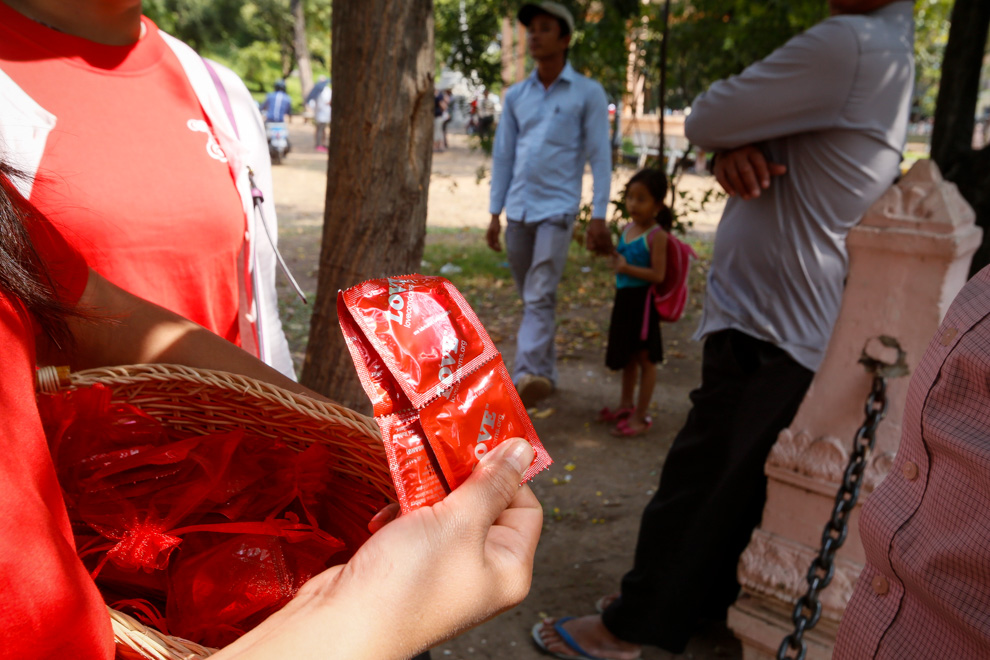
A person hands out condoms to the public in Phnom Penh this year. A new report states that a lack of access to contraception among Cambodian women has led to nearly 200,000 unintended pregnancies.
There is a significant unmet demand for modern contraception among Cambodian women, according to an annual report on family planning in 69 of the world’s poorest countries.
Released this month by Family Planning 2020 (FP2020) – a global partnership between governments, NGOs and the private sector – the study confirms that despite an increased worldwide use in contraception between 2014 and 2015, at least 133 million women globally were without recourse to modern methods.
In Cambodia, this deficiency led to 198,000 documented unintended pregnancies over the same period, while the contraceptive needs of almost half the country’s married or in-union women were unsatisfied.
“The issue isn’t that methods aren’t available,” said Christopher Smith, clinical research fellow at the London School of Hygiene and Tropical Medicine, who conducted a major study on family-planning in Cambodia.
“One of the main reasons not to use contraception is fear of side effects . . . Another barrier is that women often have to discuss with their husband or partner prior to using contraception.”
About one quarter of Cambodia’s women were found to use modern contraception – predominantly the pill, injectables or condoms – with an additional 119,000 adopting some form of contraception over the past year.
However, on other key indicators of demand for contraception, which FP2020 deems a fundamental right, progress has been slower, with the needs of about one in three Cambodian women going unmet.
According to researchers, this is highest among those in rural areas and lower-income brackets, and can be partly attributed to misinformation or social stigma.
The United Nations Population Fund (UNFPA) says it is therefore targeting behaviour change and education among demographics with the highest need.
“UNFPA’s focus will be . . . rural and remote provinces, adolescents and youth, and key high-risk populations to ensure that they access quality family planning counseling and services,” said UNFPA country representative Marc Derveeuw, who nonetheless noted that Cambodia’s annual increase in contraception use aligns with the global average of about 1 per cent.
As Derveeuw explained, UNFPA efforts will include age-appropriate educational campaigns with the Ministry of Education, Youth and Sports, incorporating mass media and school curricula.
However, others working in the field say government efforts should extend to greater investment in services, such as stepping up access to health care and counselling from qualified providers.
“The government has so far committed resources to issues like buying condoms”, said Chan Theary, executive director of maternal-health NGO RACHA.
“This is good, but this is not just a community-level issue, so there needs to be more effort to create linkages with qualified health care providers, NGO partners and aspects of the private sector.”
Representatives of the Ministry of Health’s National Maternal and Child Health Centre were not available for comment.
Contact PhnomPenh Post for full article
Post Media Co LtdThe Elements Condominium, Level 7
Hun Sen Boulevard
Phum Tuol Roka III
Sangkat Chak Angre Krom, Khan Meanchey
12353 Phnom Penh
Cambodia
Telegram: 092 555 741
Email: [email protected]










